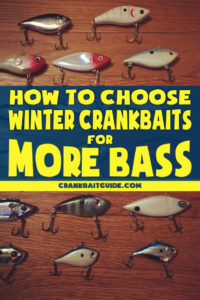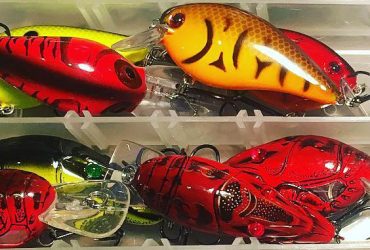What Crankbait Color to Use for Winter Bass?
Ready to outfish your friends this winter? Want to be too busy reeling in fish to even feel the cold?
We froze our marbles off and caught a lot of fish to bring you this guide on what crankbait colors to use in winter.
Crankbaits provide an advantage in winter because you can cover lots of water when fish aren’t moving as much. When in the lure aisle choosing your baits, try these crankbait color recommendations.
Shad Imitation Crankbait Colors Work Well in Winter
In late fall and winter, Bass feed on other fish. The young threadfin shad is a favorite bass food this time of year. This forage is easy to imitate with a crankbait.
Choose small baits in the .25oz to 0.5oz range. You can go up to the .75oz range, matching your crankbait to the plentiful young shad. If you can net some to check the size, that will give you an advantage. But, it isn’t necessary.
To choose color, think about the water and lighting conditions.

This white belly shad crankbait worked well for a winter bass. Water color will determine whether you want to go more natural. Original pic by @fishingwithmg on instagram
Bluegill Imitation Crankbait Colors For Winter Bass
Bluegill are less colorful in the winter, but bass still feed on them. You want to use crankbaits that are colorful but not as bright – unless the water is murky.
Muted chartreuse, orange, blue, and yellow are good colors for this time of year.
Crawfish Behave Differently in Winter, and Your Crankbaits Should Too
If you fish colder northern water, crawfish stay put in the winter. They hide in crevices and don’t come out much. They’ll stay active until the water drops below 50 degrees. Below 45 degrees, try something else for the rest until the water warms up again.
In warmer water, you can still catch them hanging out on rocks and ledges through the winter. They’ll be more camouflaged than the springtime, so color choice is different.
Crawfish this time of year aren’t full red. They often have brown, blue, or grey on their backs. There are many shades between those that will work. In some water they’ll change to brown, yellow, or green on the underside as well.
Matching the hatch will be especially important this time of year. It will also be more difficult.
Match The Hatch and Mix Up Presentation
In the end, you can’t go wrong matching what they’re eating. Remember to change your presentation if these color tips aren’t catching many fish.




